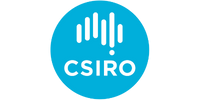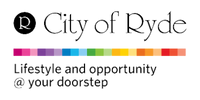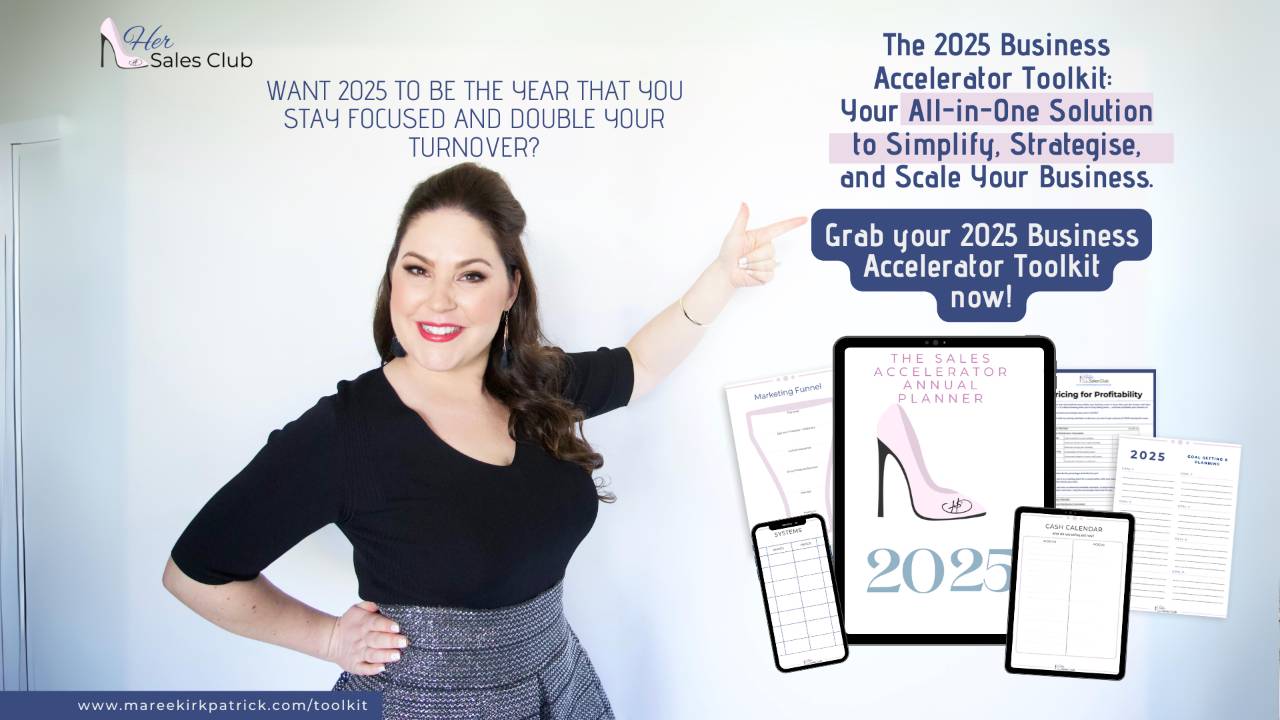Podcast Episode

Maree Kirkpatrick takes listeners on a journey through the crucial components of effective sales conversations. Beginning with her personal insights observed at the Royal Sydney Royal Easter Show, Maree explores how businesses can transform sales calls from uncomfortable encounters into genuine, value-driven conversations. The episode shines a light on the pressures women feel in sales, like self-worth doubts and fear of being disliked, and offers actionable advice to overcome these hurdles. Maree introduces a simple, effective sales framework that focuses on making connections, asking meaningful questions, bridging solutions, and maintaining a calm, confident demeanor. The goal is not just closing deals but understanding potential clients' needs and aligning them with the right solutions. Through relatable anecdotes and a conversational approach, Marie leaves listeners with a refreshed outlook on sales: one that emphasizes trust, clarity, and authenticity.
Key Takeaways
-
Shift your mindset from selling to serving; view sales conversations as opportunities to guide decisions.
-
Sales conversations should be about connection, not pressure or convincing.
-
The Discover and Uncover phase is crucial—spend 80% of your time here.
-
Silence is a natural part of conversations; allow potential clients space to think.
-
Prep your energy before each call to ensure clarity and confidence.
TRANSCRIPT
Hello, and welcome back to the sales show. I'm your host, Maree Kirkpatrick. And today I want to talk about sales conversations. I went to the Royal Sydney Royal Easter Show yesterday with my beautiful family, and what an amazing day we had now! I love going there for the experiences and all of that. But one of the benefits that I got out of yesterday that I didn't realize was also looking at businesses because people pay. I assume I don't know, but I assume a lot of money to be at large events like this, promoting their business, making money all that sort of fun stuff. And so what I didn't think about when I was organizing the family to go to the Easter show was I didn't expect to get big highlight, and Aha! Moments from a business perspective.
So people spend a lot of money at these to show right? A lot of money. I'm talking like hundreds and hundreds of dollars per family. I think we did ours on the cheap, and it probably we probably spent up to about $500 for the day. But what I found really interesting was watching and observing people's behavior on how they buy, how the business owners are selling and all that sort of stuff. So today's episode. I want to talk about how we actually have those sales conversations without feeling pushy, without feeling gross, without it, feeling uncomfortable for either person. Right? And it's going to be real talk. It's like woman to woman business. Let's talk about this stuff because I know that women really struggle with sales calls. At times they worry that it is based on their self-worth. They worry that people won't like them, you know. They get sweaty palms. They second guess themselves.
Their internal dialogue is, I'm not good at this. They don't like me. Am I too much? Am I too loud? Am I too full on? Does she not like my jokes? All that sort of stuff. And so what we tend to do is go. We'll lower the price, or we'll over commit. We'll go out of scope. you know we'll deliver. We'll promise and deliver all this stuff to reduce the value that we're actually providing. And so if this sounds like you. I want you to keep listening. If this sounds similar to what you've experienced before, I want you to know that I totally understand it right. I've been in that position, too. It was when I 1st started out of my consulting business, because when you work for someone else, and especially from a sales perspective. You have like a base salary, and then you've got commissions or depending on different structures. And so when I was working for someone else, it was like no one was listening to my sales calls. The business made money, anyway, like it didn't just solely rely on me.
Then. Obviously you start your own consulting firm, and guess what all the sales are on you. And so for me, I had to really work with the internal dialogue, and to really systemize and have a really streamlined approach to my sales calls. And this is why I do what I do, because I know that I can help women with this. So here's what I want you to understand about today's episode. Sales calls do not have to be uncomfortable. What? But they are. But I'm just nervous, but I'm just one of those people. No, you don't have to be one of those people right. They don't have to be uncomfortable. They don't have to be pushy. They don't have to feel like you're trying to convince someone, and they definitely don't have to feel like this big grand performance that every time you go to get on a call or talk to someone about your products and offers that you're like, Oh, this feels gross. Okay, they can feel easy. They can feel simple. Because if we look at it, we are just building connection. We are holding space for someone to make a decision. We're giving them information. We're allowing them to process it. We're showing them how we can help, and then we're inviting them to take on the solution that we know will help them move forward right? That's what sales is. I remember talking to one of my beautiful clients, and she was like, Oh, you know, I don't really like sales. I don't want to be salesy. No one wakes up one day and goes. I can't wait to be a salesperson. I don't know anyone that does. I? Didn't. I know that for me it was. I wanted to help more people. and even yesterday, going back to the Easter show thing. They had a whole police demonstration and exhibition at the show. They also had police dogs, and my goal or my career when I was younger, was to join the police force. That's what I wanted to do because I wanted to help people. After seeing yesterday's exhibits, I was like, Wow, it's so amazing to be in a place of gratitude for people that are on the front line in that protect us.
But also I'm really glad that I didn't go down that track, because me as a person, I'm so emotionally attached to what I do and my career. and I want to help more people that I knew that that wasn't right for me. So when I connect with people, when I talk to them about their business, that concept is still the same. I still want to help people. So when I was talking to this client, I was like, if you don't sell, you don't help people. So look at it as selling is serving. Okay, that's all it is. It's finding people that have challenges that you know you can absolutely help. Okay. So I want you to shift your mindset from selling, to serving and to guiding them in making a decision to either work with you or not. Okay, because that my beautiful people is where the magic happens in that mind. Shift that mindset shift. Goodness, that was a little bit challenging. Okay? So today, we're going to dive into the no pressure, simple framework that I use and I teach. Inside her sales club. I take my clients through it. I was even chatting to some clients this morning about it.
It's really easy when you follow it. Right? Then we're going to go into how to lead a sales call from a place of confidence and from a really calm place with knowing that you're good at what you do and that you can help people. Okay? And then we want to show up as the expert without overselling it, without overcharging, without trying to convince people. Okay, so let's get into it. Let's talk about sales, conversations and sales calls that they are literally just a conversation. Right? So the 1st thing we need to do is change the way we think about sales calls. It's not about getting the yes, it's not about closing a deal. God! I hate the words closing a deal or closing deals. It sounds so. It feels disconnected. It feels like someone's won and someone's lost right for me. It's about helping someone decide whether you are right for them or not. And if they're not right for you or you're not right for them. That is okay. I'm giving you permission to not to have to work with everyone. Some people aren't our people. And that's okay? Right? So in those sales conversations, I want you both to walk away, knowing whether they are your people or not, and getting someone to make a decision to move forward with you or to say, Do you know what? You're not right? But I really appreciate your time. Maybe you can even pass them on to someone else. You're not chasing. You're not closing deals. You're not cornering people into saying yes, you're not trying to convince people. We're not dropping our pants and getting people like getting people on board when we're not earning any money. And we're not profitable. And it's stressing this out.
Okay, we're offering clarity. We're offering them what's possible. And you're saying, if we aligned I'd love to help you and support you in your journey. Okay? And when you hold that energy. the conversation and the vibe shifts. Okay? And you lead with curiosity and expertise and not the pressure. and that, my beautiful humans is what people respond to at the Easter show. I stood watching in the gaming section, right? So there's an area where you can go, and it's like the gaming alley you go, and you can play the clouds. You can play the ducks, you can play the basketball game, you can play all of that. And there's people that are literally selling to you as you walk past. Come and buy some balls, come and win a sloth, which was what one lady was aiming for yesterday and watching all these people convince people to buy from them was really fascinating, because the ones that were successful and had people lining up were the ones that weren't convincing people. They were creating a vibe and an experience. That is what we want to do in every single conversation we have with our potential clients. Okay, that's what people are going to respond to. I have a sales conversation or sales core framework that I use. Notice. It's not a script. I know some people like just Maree. Tell me what to say, and I'll say it, and I'll close the sales. No talking to the wrong person. Go and find someone else that does scripts. I don't do scripts. I don't do scripts, because what I feel like is right. What you feel like is right when the words come out of your mouth may be completely different. I don't want to force you into a box by using a script, so I tend to use a call guide. Okay? And the reason why I use a cool guide, and why all my clients in her sales cloud my Vip clients use a guide is because it's more connective, and it's heartfelt for the person using it. And it works right. I'm not trying to change you into anyone that you're not. I'm not telling you. You've got to be a certain way. I'm not telling you. You've got to use certain words. I'm giving you the framework that you can use that you just need to guide people through.
So step one is that connection. Now, this may sound really basic, and it may be for some people. But what I want to get clear on is that I want you to be human. You're not a pitching machine. You're not a sales machine that's just generating cash without emotions and feelings and thoughts and ideas. Okay, I want you to connect. And if you're using AI in your business, and I know I've spoken about this before. Add in that connection. Okay, so we want to build the rapport we want to connect. We want to find out what's inspired them to connect with you. You want to understand what's going on for them, and how you can help keep it light. Keep it fresh. and having these, having that connection part at the start, allows for it to be a safe and grounded conversation. Okay, it's not like. it's not regimented. Okay? So it's safe, it flows. It's clear it's nice. Then we want to go into the discover and uncover face. Now, this is 80% of the sale. 80% in everything else that you do on your calls. This is 80%. You can stuff them up. You can. Whatever needs to happen. You're allowed to be human in all of this. But I need you to understand that the discover and uncover phase is 80% of your sale. Okay?
And this is where you need to ask really great quality questions and lean in and listen right? Ask questions and listen. Don't just ask questions for the sake of answering asking questions. You need to listen to the answers and what people are telling you. So ask open-ended questions. Tell me a little bit about what's going on for you. What made you reach out today? What are you looking for in the next few months? What does success look like for you? Have you tried anything else. What's worked for you in the past? All these sort of questions allow an open, flowing conversation. and this is where people will give you some really good quality information. Okay, we're discovering what's going on for them. We're uncovering any challenges. We're understanding how we can help. Let them talk. Listen for the words and the language that they're using. Okay, If you walk away with nothing else from today's podcast 80% of this out, discover and uncover. Ask really good questions. Number 3, we want to get clarity on what it is that they're looking for. So I call this the transition phase. So I call this a transition phase, because I want to make sure that I've understood everything that they've told me. I want to understand exactly what it is that they're looking for, what experiences they've had, what they've tried in the past, what worked, what didn't work, what's going on for them. And I want to gain that clarity and reflection and understand their vision. Okay, paint the picture for them. So it's sounding like Sally, you're really after XY, and Z. But you've been stuck here, or you've had this, or you're wanting. This. Is that right? Get that confirmation. Let them feel understood. Make sure you have ticked all the boxes that they're looking for. Okay, if you don't get that confirmation, what tends to happen is if we haven't discovered and uncovered properly. When we go to talk about our offers and pricing, then we have a challenge. Okay. so then we, what we want to do is we then want to transition into what it is that we do. Okay, so this is where we use our bridge framework. So our bridge is how we talk about our products and services. We want to look at the features, the benefits, the outcomes, what's in it for them?
Okay, once we have done the bridge. We then go into pricing. Now I was talking to one of my beautiful clients today, and we went through some notes that she'd had with a potential client. And when we were talking about this call and the conversation, she was saying, oh, this one's a bit different. Because this person just randomly called out of the blue. This sales conversation framework isn't just, for when you're ready it's for when people call, it's for when people email you, it's for when people DM, you, it's for when people walk into your shop, whatever that looks like for you. Okay. But what I want you to understand is if someone starts with the pricing question, how much is it to work with you? Can you give me a guide on pricing investment whatever that is. What we want to do is we want to take them back to at least the discover and uncover phase. Okay. we want to understand what it is that they're looking for. You do not have permission to sell unless you are super clear on how you can help them. Okay. So we want to go back to our discover and uncover phase before we go into the pricing. so discover and uncover phase. Then we want to transition into talking about what it is that we do, how we can help make sure we're clear on what it is that they're after.
Then we go into the bridge, talking about our offers, our inclusions, what they get from working with us. Then we go into an investment and the pricing. Okay, once we've spoken about your pricing. We then want to invite them in. Ask for the sale. Okay, this is the shift. This is the place in that conversation where people are asked to make a decision. Okay, instead of pitching, you're inviting.
I would love to share how I can work with you. I would love to work with you, would you like to move forward? Does it feel good for you? Would that work for you, like all these sort of questions are asking for the sale. Okay? And then we want to make sure that we're showing our expertise. So we want to make sure that we are talking about what it is that we do, how we help past experiences, share wins from past clients. Show the real impact that you have had working with people. One of my beautiful clients I was talking to today has helped over 35,000 families. 35,000 families, not people, families. Do you know how much impact that has had. Oh, game changer, massive. Right? She's making impact and income. I want you to share the impact that you have had. Okay, people need to feel safe knowing that you've done this before. Okay? And then, once we've invited them in, then we want to talk about any questions or answer any questions that they've got and overcome any objections. Now people feel like when they get an objection. Someone says, Oh, I need time to think about it. That that's the end of the conversation, and it's not if you follow the call guide. It is not the end of the conversation. It is just another point to open up the conversation more to give more information, to show them more about you, how you work the results that you get. Okay? So that's the sales call guide or the Sales Conversation Guide. But I want to touch on some areas that I see people fall down okay. And these can become habits that people develop.
So I want to kind of knock them on the head now for you. So the 1st thing I see is people rambling through their office. They're over explaining. People get confused. They're like trying to give too much detail. And you're like, okay. Now, things are getting a bit muddy, and the client isn't clear on how you help, or they go into that overwhelm clarity converts. Okay, so instead, keep your offer simple and focused on the outcomes and the benefits, the reasons why they would work with you. Okay. the next thing that I want you to be aware of is stop trying to prove yourself. Stop trying to convince people. If you feel like you're convincing people, or you're trying to prove yourself. I want you to stop. And I want you to think about what it is that people need to know for them to move forward with you. I want you to speak confidently about how your offer helps people and bring it back to the real examples. Okay? And the final little hiccup that I see is people aren't comfortable with the silence. They feel like they've got to keep feeling that silent. those silent pauses in the conversation that are absolutely natural in normal conversations. If it was a sales, conversation, pauses in conversations are natural. Okay, stop trying to fill it. Silence does not mean that they don't like you. It doesn't mean that they're saying no, it may just mean that they're thinking. Give them some thinking time and some thinking space instead, just breathe. I remember when I 1st started out in sales, and things would go quiet, and I'd be like trying to feel that quiet moment. And I was like, I've got to find a better way to do this, because I keep talking and talking and talking. Oh, what, Maree? Keep talking? No, never. Yeah. I did. Okay. So instead, what I do is when I asked for the sale, I would just stop, and I would actually cover my mouth. I'd kind of like, hold my lips. I'd just put my finger over my lips. The person in front of me would not know that I was doing that purposely or consciously. But for me it was like a cue for me to just stop talking, Maree, and let them process. Give them some space. and the more space I give I gave them the better my sales results were okay. So I know that this stuff works find little things that you can do. Some people will have a little pen, and they'll scribble things down, or they'll have something that they can play with, or some people rub their hand like their finger on their hand, like there's really.
when you're aware of it, there's really interesting cues that you can watch when people are feeling uncomfortable in that in that silence. But I want you to be okay with that silence and give them time to process. If you don't give them that time to process, they'll give you an objection like I need time to think about it. because you haven't given that given them that space on the call. Okay? So give them that time and be okay with the silence. The other thing I want to touch on today was about the energy you take into sales calls. And this really goes into all sales, conversations. And I believe energy in general, right? So when you feel things coming up, or when you feel like you know, you might be a little bit uncomfortable. I want you to check in with your head what is going on between your ears. Okay, before every call. Just take a second to ground yourself and to think clear thoughts. You are here to serve. You are the expert. They're coming to you for a reason I may not be for everyone, and that is okay. I know when I jump on calls, and even if I'm feeling a little bit nervous. Maybe it's a next step up in a client level, or I'm stretching myself outside my comfort zone. I will literally talk to myself and be like Maree. You've been doing this for years. You're very good at what you do. You've got this if they say no, that is okay. That does not determine the future of my business. That does not mean that everything's going to fall apart. That does not mean that they don't like me. Maybe it's not the right time, the right fit, whatever it is.
But if I don't have my head clear before I jump on a call. It's really challenging. Okay, so give yourself time to prep your energy. I sometimes also journal to myself, I do meditations. Just give yourself. Give yourself time to take a breath. You can also review a win. I know one of my beautiful friends that has been in and out of my business for many, many years. we'll say every time a client tells you something good, or writes how amazing you are, or anything along those lines. File it. and then, when you're having those moments of self-doubt. Go back and read them. Okay, I remember presenting one day, and there was a little bit of a hiccup during the presentation, and I called my husband afterwards, and I was like, Oh, Babe, I think I've stuffed this. and he was like, what? Why, he's like. Don't worry about it. You're human, like you're good. I think it'll be fine. As soon as I jumped off the call from him I had a voice message from the other business owner that I ran the training for, and she sent me this amazing voice message of like, you're freaking, brilliant. I can't believe how good you are. You're so streamlined with what you do. It's easy to understand the ladies love it. The reviews already coming in. I'm getting amazing feedback. Do you know what I did. I downloaded that recording, and I've kept it in my download area of like where I need that little pep sometimes, and I listen to it when I'm having moments of like, I can't do this. I'm not good enough. What if they don't like me? All that sort of fun stuff.
So it's okay to have moments like that. But I want you to be wary of the energy that you're putting out there. Okay, so let's wrap it up for today. Sales calls, not about pressure. They're not about convincing. They're not about trying to devalue yourself or anything along those lines. They're about connection. They're about partnership. They're about serving people and showing them how you can help. Okay, we are not closing anyone. We're not closing deals. We're not closing clients. We're not doing any of that sort of stuff. You're inviting someone to take a really powerful step towards working with you. walking alongside you. Okay, there's no, this like Oh, I won, and they lost, and I've convinced them. And oh, Gross! Okay, we're inviting them to come and work with us. I want you to also think about and consider how you hold your space and how you can really bring in that clarity. Okay. if you're a woman listening to this. Then you probably know what I mean. But we're about connection. We're about those relationships. And if it doesn't feel right for us. it's uncomfortable. And so I want you to connect in with you and connecting with how you're helping people and how you can serve them.
If you want some more help with getting this support, come and join her sales club. We have these conversations on a regular basis. We talk about our energy, we talk about how people are perceiving us, and how we make more sales with that connection and relationship focus space. So come and check it out. Maree kirkpatrick.com/club. All the info is in there, we refine it. We practice this sort of stuff over and over and over again, and we make it a part of your everyday language. We make it a part of. It's just like the new way that you do things, and I love when my beautiful clients, both in her sales club and VIP clients. I'm like, Wow, sales is so easy when you know. And I'm like, Yeah, this is what I keep saying to you. Sales is sexy. Sales is easy because they've got that framework and that guide that they just constantly work through. They know the steps they know they just need to keep going over and over and over. If this resonated with you today, I would love for you to share it on social media. Write to me tell me what your big Aha's were in this episode. Share it with me because I love hearing this sort of stuff. I'd also love to know what's the shift you're making or going to make in your sales conversations this week. Whether that's online, whether that's over, Zoom, whether that's over the phone, whether that's why email, what can you do differently to increase your conversions and for sales conversations to feel so much more comfortable for you. You now have all the tools, go out and use them, and really build the business that you're after. Have a magical week and happy Easter.
COMPANIES WE HAVE WORKED WITH:














